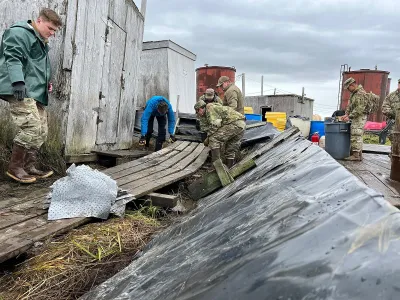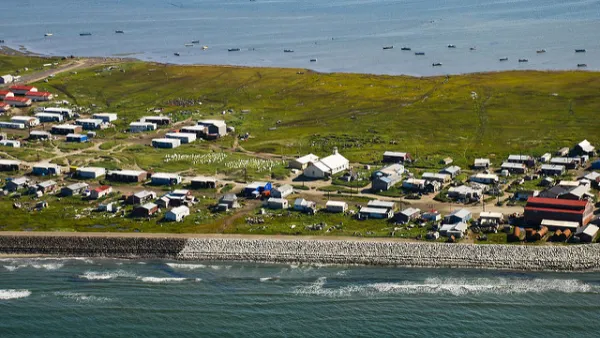Increasingly threatened by the impacts of climate change and extreme weather, many Native Alaskan and other indigenous communities will have to relocate—and soon.

An article by Emily Schwing in High Country News describes the challenges facing Native villages in Alaska and other parts of the United States, where “Melting permafrost, increasing wildfire threats, severe drought and other climate-change related phenomena mean dozens, perhaps hundreds, of small, predominantly Indigenous communities across the nation may need to move.”
The Alaskan village of Newtok only had a nomadic population until the mid 20th century, when federal authorities told Yup’ik residents that they had to settle permanently to access federally funded schools. “But the land in Newtok has never been all that stable: Since the 1950s, the banks of the Ninglick River have been eroding at rates as high as 70 feet per year.” As Schwing notes, the community has been painfully aware of this. “For more than two decades, Newtok has been trying to plan for a full relocation.”
The federal government has started awarding grants to communities needing to relocate. But with a total cost estimated at $120 million or more for the Newtok relocation, how far can a $25 million grant, awarded by the federal government through the Bipartisan Infrastructure Law, go?
The village faces with a slew of costs that won’t be covered by the federal grant. Patrick LeMay, the Newtok relocation project manager, estimates a need of $8 million for additional housing, plus $60 million for a school, $2.3 million for a health clinic, and other infrastructure needs. As the impact of climate change intensifies, more communities will need assistance.
FULL STORY: How far can $25 million go to relocate a community that’s disappearing into Alaska’s melting permafrost?

Analysis: Cybertruck Fatality Rate Far Exceeds That of Ford Pinto
The Tesla Cybertruck was recalled seven times last year.

National Parks Layoffs Will Cause Communities to Lose Billions
Thousands of essential park workers were laid off this week, just before the busy spring break season.

Retro-silient?: America’s First “Eco-burb,” The Woodlands Turns 50
A master-planned community north of Houston offers lessons on green infrastructure and resilient design, but falls short of its founder’s lofty affordability and walkability goals.

Test News Post 1
This is a summary

Analysis: Cybertruck Fatality Rate Far Exceeds That of Ford Pinto
The Tesla Cybertruck was recalled seven times last year.

Test News Headline 46
Test for the image on the front page.
Urban Design for Planners 1: Software Tools
This six-course series explores essential urban design concepts using open source software and equips planners with the tools they need to participate fully in the urban design process.
Planning for Universal Design
Learn the tools for implementing Universal Design in planning regulations.
EMC Planning Group, Inc.
Planetizen
Planetizen
Mpact (formerly Rail~Volution)
Great Falls Development Authority, Inc.
HUDs Office of Policy Development and Research
NYU Wagner Graduate School of Public Service




























